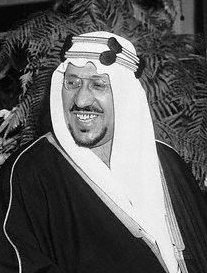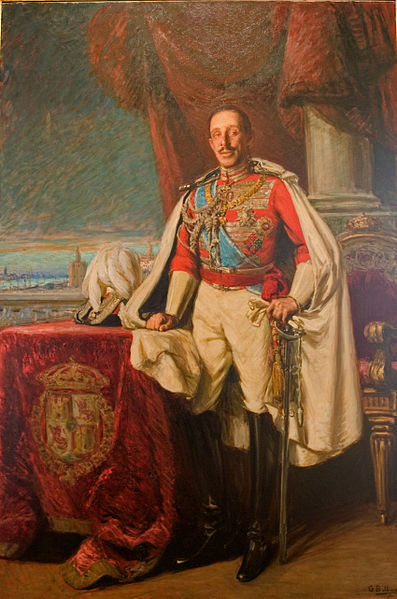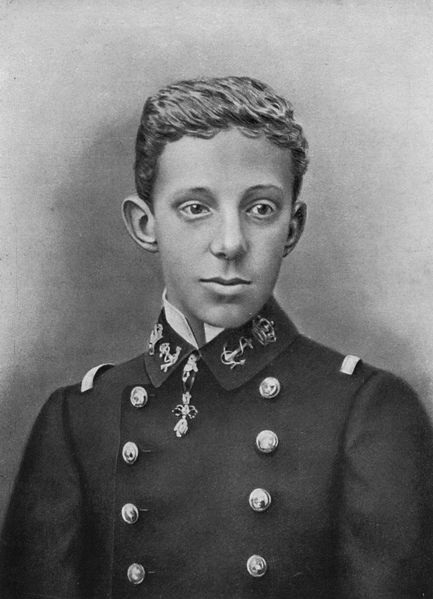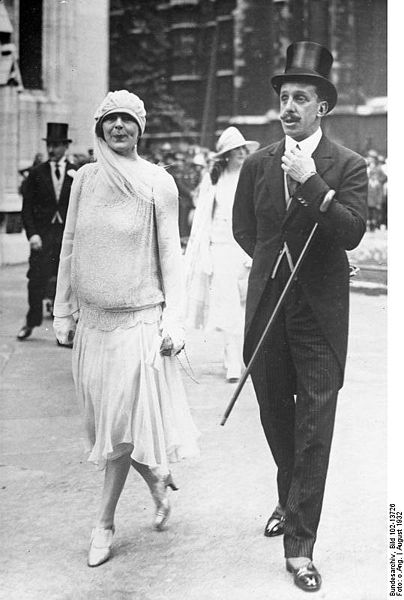<Back to Index>
- King of Saudi Arabia Saud bin Abdul-Aziz al-Saud, 1902
- King of Spain Alfonso XIII, 1886
PAGE SPONSOR

Saud bin Abdul-Aziz Al Saud (January 12, 1902 – February 23, 1969) (Arabic: سعود بن عبد العزيز آل سعود Su‘ūd ibn ‘Abd al-‘Azīz Āl Su‘ūd) was King of Saudi Arabia from 1953 to 1964. He was removed from power by Faisal because of Saud's mismanagement and waste. He was the eldest surviving son of Ibn Saud and became Crown Prince in 1933. He died in exile in Greece.
Saud was born in 1902 in Kuwait. He was born in the home of Amir Abdul Rahman bin Faisal. They were in the district Sakkat Anaza where the family was staying after their exile from Riyadh. After his father Abdulaziz conquered Riyadh in 1902, Saud followed him with his mother and brothers. His mother was Princess Wadhha bin Muhammad bin Burghush Al Uray'ir of the Bani Khalid tribe.
When he was five years old, his father took him to Sheikh Abdul Rahman Mufaireej. He was taught sharia and the Qur'an. He also learned archery and horse riding. He also had smallpox, but Abdul-Aziz made Saud attend the meetings that he held in order to learn and develop political skills. Moreover, Saud was very close to his father, so much so that when he died Saud said "I lost my father…and my friend".
When he was thirteen years old, Saud's first political mission involved leading a delegation to Qatar. He led the first war against Hail in 1921, and became the leader of the Saudi troops fighting in Yemen. In addition, Saud participated in eight wars before he came to the throne: Grab War, Yabet War, Truba, Alkuras, Hail, Alhijaz, Almahmal and the Brethren.
Before
becoming king, Saud and his half-brother Faisal were the caretakers of
the country because of Abdul - Aziz's ailing condition. On May 11, 1933,
he was made Crown Prince.
When Ibn Saud died in 1953, Saud became king.
He had cordial relations with Egypt at the beginning of his reign. He felt challenged by the Hashemite kingdoms of Iraq and Jordan. Saud became weary of Egyptian influence in the Arab world. This led to numerous diplomatic blunders, such as a supposed plot to assassinate Gamal Abdel Nasser. Egypt and Saudi engaged in a regional cold war. During the Yemeni Civil War, Saud supported the royalist and Egypt supported republican forces.
He was responsible for the establishment of numerous governmental ministries. In 1957, he founded King Saud University in Riyadh. He had 53 sons and 56 daughters and was keen to give his own sons power, and placed them in high governmental positions. This annoyed his half - brothers, who thought that Saud's sons were too inexperienced, and began to fear that Saud would select his own son to succeed him. He was also known for his lavish spending squandering state funds for his own family, and on palaces, all at a time when Saudi Arabia was still struggling economically.
Between
1953 and 1964, the appointment of eight ministers were partly to
contain the fermenting demands for political participation among members
of the royal lineage. By 1957, Saud placed his son Fahd as Minister of
Defense, his son Musaid to lead the Royal Guard, his son Khalid to lead the National Guard and his son Saad in the Special Guard.
A fierce struggle between Ibn Saud's most senior sons, Saud and Faisal, erupted immediately after the death of King Abdulaziz. The increase in oil revenues did not solve the financial problem associated with the debts Saud had inherited from his father, estimated to have been $200 million in 1953. In fact, this debt more than doubled by 1958, when it reached $450 million. The Saudi riyal lost half of its official value against the dollar. Both ARAMCO and international banks declined Saudi's demand for credit. Saud suspended the few government projects he had initiated, but continued his spending on luxurious palaces.
Saud and Faisal fought an internal battle over the definition of political responsibilities and the division of government functions. Saud is often associated among other things with plundering of oil revenues, luxurious palaces, conspiracy inside and outside Saudi Arabia, and vice. Faisal is associated with sobriety, piety, puritanism, financial wisdom and modernization. Moreover, the conflict between the two brothers is often described as originating from the desire of Faisal to curb his brother's spending and solve Saudi Arabia's financial crisis.
The
battle between the two brothers was fought over the role to be assigned
to the Council of Ministers. Saud abolished the office of prime
minister by royal decree, thus enforcing his position as King and de
facto prime minister. Saud thought of himself as both King and prime
minister whereas Faisal envisaged more powers in his own hand as Crown
Prince and deputy prime minister.
King Saud's family members worried about Saud's profligacy and his inability to meet Nasser's socialist challenge. Corruption and backwardness were weakening the regime. Radio Cairo's anti - Saudi propaganda was finding a receptive audience.
Saud and Faisal continued their power struggle until 1962, when Faisal formed a cabinet in the absence of the King, who had gone abroad for medical treatment. Faisal allied with Fahd and Sultan. Faisal's new government excluded the sons of Saud. He promised a ten point reform that included the drafting of a basic law, the abolishing of slavery and the establishment of a judicial council.
Saud rejected Faisal's new arrangement and threatened to mobilize the Royal Guard against his brother. Faisal ordered the mobilization of the National Guard against Saud. With the arbitration of the ulema, and pressure from senior members of the royal family, Saud gave in and agreed to abdicate on March 28, 1964.
Saud was forced into exile and he moved to Geneva, Switzerland, and then on to other European cities. In 1966, Saud was invited to live in Egypt by Colonel Nasser. After his abdication, he was generally not mentioned in Saudi Arabia, with numerous institutions bearing his name being renamed. His reign was only referenced in passing in official history books. Likewise, his sons remained largely marginalized from positions of power though two were named governors to minor provinces during the reign of King Fahd.
Two days before his death, he had fallen ill and asked his doctor Filnger from Austria to
examine him. In the morning, Saud took a short walk on a beach with his
daughter Nozhah, near Hotel Kavouri, where he used to reside. His
physician arrived after he had died in Athens, Greece, on February 23, 1969, after suffering a heart attack in his sleep. His body was taken to Makkah then to Riyadh where he was buried in Alaoud cemetery.



Alfonso XIII (Alfonso León Fernando María Jaime Isidro Pascual Antonio de Borbón y Austria - Lorena; 17 May 1886 – 28 February 1941) was King of Spain from 1886 until 1931. His mother, Maria Christina of Austria, was appointed regent during his minority. In 1902, on attaining his 16th year, the King assumed control of the state.
Alfonso was born in Madrid, posthumous son of Alfonso XII of Spain, and became King of Spain upon his birth. The French newspaper Le Figaro described the young king as "the happiest and best - loved of all the rulers of the earth".
When he came of age in 1902, the week of his majority was marked by festivities, bullfights, balls and receptions throughout Spain.
During his reign, Spain lost its last colonies in the Americas (Cuba and Puerto Rico) and the Philippines; fought and, after several setbacks, won a war in Morocco; witnessed the start of the Spanish Generation of 1927, and endured the dictatorship of Miguel Primo de Rivera, which ultimately cost him the throne.
During the First World War, because of his family connections with both sides and the division of popular opinion, Spain remained neutral. The King ran an office for captives from the Royal Palace, which leveraged the Spanish diplomatic and military network abroad to intercede for thousands of prisoners - of - war, receiving and answering letters from Europe. However, he became gravely ill during the 1918 flu pandemic and, since Spain was neutral and, thus, under no wartime censorship restrictions, his illness and subsequent recovery were covered worldwide, giving the false impression (in the absence of real news from anywhere else) that Spain was the most affected area. This ultimately led to the pandemic getting the nickname "the Spanish Flu."
Alfonso was a promoter of tourism in Spain. The problems with the lodging of his wedding guests prompted the construction of the luxury Hotel Palace in Madrid. He also supported the creation of a network of state run lodges (Parador) in historic buildings of Spain. His fondness for the sport of football led to the patronage of several "Royal" ("Real" in Spanish) football clubs such as Real Madrid, Real Sociedad, Real Betis, Real Club Deportivo de La Coruña and Real Unión.
When the Second Spanish Republic was proclaimed on 14 April 1931, he fled and left Spain, but did not abdicate the throne. He settled eventually in Rome where he lived in the Grand Hotel.
Once the Spanish Civil War broke out, Alfonso made it clear he favored the military uprising against the Popular Front government, but General Francisco Franco in September 1936 declared that the Nationalists would never accept Alfonso as King (the supporters of the rival Carlist pretender made up an important part of the Franco Army). First, he went into exile in France. Nevertheless, he sent his son, Juan de Borbon, Count of Barcelona, to enter Spain in 1936 and participate in the uprising. However, near the French border, General Mola had him arrested and expelled from the country.
On 15 January 1941, Alfonso XIII abdicated his rights to the Spanish throne in favor of his third (of fourth), but second surviving, son Juan, father of King Juan Carlos. He died in Rome a month and a half later.
The Spanish Government ordered three days of national mourning. His funeral was held in Rome in the Church of Santa Maria degli Angeli. He was buried in the Church of Santa Maria in Monserrato, the Spanish national church in Rome, immediately below the tombs of Pope Callixtus III and Pope Alexander VI. In January 1980 his remains were transferred to El Escorial in Spain.
On 31 May 1906, at the Royal Monastery of San Geronimo in Madrid, Alfonso married Scottish born Princess Victoria Eugenie of Battenberg (1887 – 1969), a niece of King Edward VII of the United Kingdom, and a granddaughter of Queen Victoria of the United Kingdom. A Serene Highness by birth, Ena, as she was known, was raised to Royal Highness status a month before her wedding to prevent the union from being viewed as unequal.
As Alfonso XIII and Ena were returning from the wedding, they narrowly escaped an assassination attempt by the anarchist Mateu Morral who threw a bomb from a high window; instead, the bomb explosion killed or injured many bystanders and members of the Royal procession.
Alfonso and Ena had seven children. The King also had four illegitimate children. By French aristocrat Mélanie de Gaufridy de Dortan (1876 - 1937), he had Roger Marie Vincent Philippe Lévêque de Vilmorin (12 September 1905 - 20 July 1980). By Spanish actress María del Carmen Ruíz y Moragas (1898 - 1936): Ana María Teresa Ruíz y Moragas (9 October 1925 - 6 September 1965); Leandro Alfonso Luis Ruíz y Moragas (born 26 April 1929), officially recognized by Spanish Courts on 21 May 2003 as Leandro Alfonso Luis de Borbón y Ruíz Moragas. By Béatrice Noon he had Juana Alfonsa Milán y Quiñones de León (19 April 1916 - 16 May 2005).